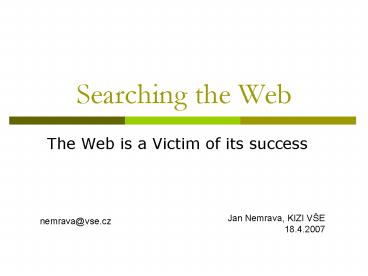Searching the Web PowerPoint PPT Presentation
1 / 15
Title: Searching the Web
1
Searching the Web
- The Web is a Victim of its success
Jan Nemrava, KIZI VE 18.4.2007
nemrava_at_vse.cz
2
Google, say Wow )
- 92 of those who use search engines say they are
confident about their searching abilities, with
over half of them, 52, saying theyre very
confident. - 87 of searchers say they have successful search
experiences most of the time, including some 17
of users who say they always find the information
for which they are looking. - 68 of users say that search engines are a fair
and unbiased source of information 19 say they
dont place that trust in search engines. - But how do you know
3
Search Engines and some numbers
- Less than 25 percent of professionals are very
confident that when using popular internet search
engines they've looked everywhere to find
answers. biz.yahoo.com - The less experience the users are the more
confident about in their searches they are. - 44 of searchers say they regularly use a single
search engine, 48 will use just two or three, 7
will use more than three. - nearly half of all users say they would stop
using search engines if they thought engines were
not being clear about how they present their paid
results. - 38 of searchers are aware of a distinction
between paid and unpaid results 62 are not
4
Is there anything missing?
- "INvisible Web", a.k.a. the "Deep Web"?
- Password protected
- Unlinked content
- Non-text content
- Intranets
- Flash and some script-based pages
- Robots.txt excluded webs
- Personal
- direct connections - icq, email, skype
- group to group - newsgroups
- -gt specialized search engines and information
sources
5
If not Google then what
- Bookmarks (online - offline)
- Specialized portals
- Links you came across
- Catalogues
- Paid sources (ProQuest, AnoPress, JSTOR)
6
What is usually searched
- People, places and things, 49
- Commerce, travel, employment and economics, -
12 - Number of commercial searches not available but
comScore Networks reports that 40 45 of
search queries now include sponsored results.
7
Searching the internet
- Most frequent words
- http//jyxo.cz/top/0
- http//www.google.com/intl/en/press/zeitgeist2006/
current.html - http//www.google.com/press/zeitgeist.html
- Most frequent forms of search
- http//jyxo.cz/top/2
8
Query Ambiguity is a big deal
- Jyxo product search
- Ambiguity (Price?, Distance from buyer?)
- Google.com, Live.com
- Vivisimo.com, Ask.com
- Desperate? How about trying
- Wikipedia
- http//www.dmoz.org/
- Or? Google, but with a restriction to one site
9
Full Texts Limitations
- Query Ambiguity
- Too many irrelevant results
- Image search usually fails
- Results ordering not always natural
- Affected by place, SEO, server, language
- Highly addictive )
10
Transition probabilities
11
Google Tricks
- Proximite search
- Attribute site
- Define
- Lexical patterns
- is a, such as, and other
- Archive
- API
12
Search Objectives
- Specific fact-finding (phone number, temperature)
- Extended fact-finding (what kind of services can
I get from this company) - Open-ended browsing (what is new this area)
- Exploration of availability (features of things
and products)
Analytical - Bottom-up
Heuristic - Top-down
13
Heuristic vs. Analytical Search
14
Effectiveness and Efficiency
professional vs amateur sources
know the given methodologies and update them
according to ones needs
Pieces of information dispersed within various
sources
Less effort in search
Lower likelihood of failure
Different strategies leading to different results
15
Zdroje
- Deborah Fallows, Search Engine Users
- This Pew Internet American Life Project,
Princeton Survey Research Associates June, 2004 - Ylikoski, Teemu Access Denied Patterns of
Consumer Internet Information Search and the
Effects of Internet Search Expertise - Witten I Web Dragons, Morgan Kaufmann
Publishers, 2006 - Invisible or Deep Web, http//www.lib.berkeley.edu
/TeachingLib/Guides/Internet/InvisibleWeb.html

